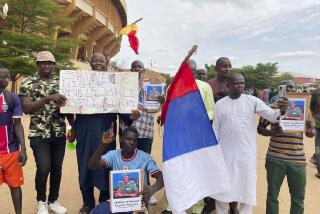U.S.-Nicaraguan Clash Stalls Contadora Peace Talks
- Share via
CARACAS, Venezuela — The mounting military conflict between Nicaragua and the United States has produced a deadlock in negotiations promoted by a number of Latin American nations for a peace and security treaty in Central America.
In light of new U.S. military exercises with Honduras and the Reagan Administration’s announcement of new direct military aid to the anti-Sandinista guerrillas operating from bases in Honduras and Costa Rica, the Nicaraguan government has hardened its position against signing the draft treaty, which is intended to reduce the arms buildup in Central America and provide peacekeeping mechanisms for the region.
“Until the United States changes its attitude, we cannot acquire new commitments on arms reductions or numbers of men under arms because we are not prepared to commit suicide,” said Sergio Ramirez, Nicaragua’s vice president, who is here for a regional economic meeting.
Nicaragua’s leftist Sandinista government has notified the so-called Contadora Group of nations--Mexico, Venezuela, Colombia and Panama--that it will not resume negotiations on the treaty until the group obtains a commitment from the United States to abide by the treaty’s provisions against foreign military involvement in Central America.
“We are not prepared to continue negotiations on side issues when Contadora does not address the central issue of United States involvement in the region,” Ramirez said.
The Reagan Administration has said repeatedly that it supports the Contadora effort, but it reserves the right to give financial and military aid to the anti-Sandinista guerrillas, known as contras, while the negotiations continue. The contras announced last week that they had shot down a military helicopter in Nicaragua, with the death of 14 soldiers aboard, using a Soviet-designed ground-to-air missile.
The effect of Nicaragua’s demand for a commitment from the Reagan Administration has been to produce a new crisis within the Contadora Group. Mexico, whose president, Miguel de la Madrid, will meet with President Reagan next month, favors the Nicaraguan position. But Venezuela and Colombia have told the Nicaraguans that they are asking for too much, according to informed sources.
The Nicaraguan position has been the subject of intensive consultations among Latin American foreign ministers, who met last week in Cartagena, Colombia, during the general assembly of the Organization of American States.
The talks on Nicaragua and future moves by the Contadora Group continued here in Caracas last week when most of the Latin American ministers took part in the 10th anniversary assembly of the Latin American Economic System, a regional coordinating group for economic affairs.
“We are looking at a very dangerous situation,” said Dante Caputo, Argentina’s foreign minister, who met here with Ramirez. “Contadora is at a standstill.” The Nicaraguan vice president also talked with President Jaime Lusinchi of Venezuela and the foreign ministers of Brazil, Peru and Uruguay, who with Argentina form the so-called Contadora support group.
In addition to Nicaragua’s resistance to resumption of negotiations on the treaty, Costa Rica--which will be holding a presidential election next year--has also called for a delay in further talks. Two other Central American countries, Honduras and Guatemala, both prospective signatories of the treaty, will install new presidents in January.
Honduras and El Salvador, which depend heavily for their security on U.S. military aid, have rejected Nicaragua’s demand that the treaty prohibit all military maneuvers in Central America by external forces.
As a result, the Contadora Group’s mediation with the five Central American countries in search of a peace and security treaty is likely to be delayed for months. Meanwhile, combat between the contras and the Sandinista army continues in Nicaragua, increasing tension in the region.
The Contadora Group, which takes its name from a Panamanian island where the first meeting took place three years ago, has worked to bring the Central American countries together on a regional security agreement that would contribute to pacifying the region. It has offered to serve as a peacemaker when disputes break out in border areas where the contras are operating.
This Latin American initiative was enhanced when the support group, representing the major countries of South America, was constituted in August to give increased political support to the mediators.
Latin America’s growing pessimism over the Central American mediation grows out of the mounting evidence that the Reagan Administration is unwilling to restrict the military presence that Washington has traditionally maintained in Central America, which it sees as a strategic security area.
Superpower or Regional?
“Reagan put Central America on the agenda of the East-West superpower confrontation, and this has superseded the Latin American initiative, which sees the problems of Central America in regional terms,” said a Brazilian diplomat involved in the talks here. “But there is no solution if the United States does not accept this interpretation.”
Carlos Rafael Rodriguez, vice president of Cuba, who was elected president of the regional economic conference here, said that the recent Geneva summit meeting between Reagan and Soviet leader Mikhail S. Gorbachev had raised hopes that a nuclear confrontation can be avoided.
More to Read
Sign up for Essential California
The most important California stories and recommendations in your inbox every morning.
You may occasionally receive promotional content from the Los Angeles Times.













